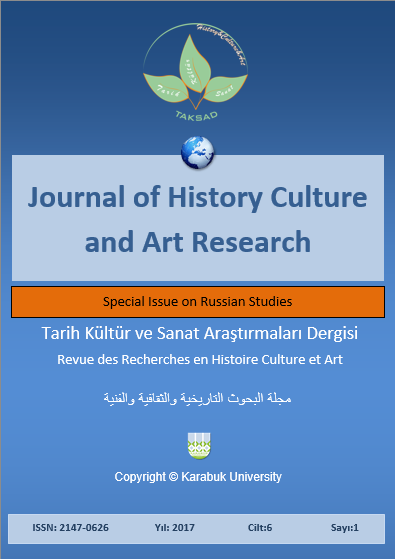Students’ Worldview Attitude and Education Content Orientation
DOI:
https://doi.org/10.7596/taksad.v6i5.1269Anahtar Kelimeler:
Worldview attitude- Identity- Eeducational content- Overall picture of the world.Özet
The idea of students’ worldview attitude application when forming educational content is proved in the article on the basis of scientific literature. In particular, it is claimed that any natural phenomenon can be comprehended, apparently, two-fold: either through its comparison to other beings or the phenomena, or through disclosure of its own unique nature. For example, studying the person "from the outside", assumes interpretation of the relations good fortune, the nature (space), society (culture), the law and other people. Approach to the secret of the person is accompanied by comprehension of his corporal, emotional, moral, spiritual and social life "from within". In many respects it depends on what methodology will be chosen by the researcher, and, the choice of methodology is connected with worldview attitude of the personality. In the publication definition of worldview attitude is given; briefly the essence of such worldviews as teocentrism, logocentrism, cosmocentrism, sociocentrism, anthropocentrism are revealed, as well as results of pilot study from students’ worldview attitude of higher education institution are presented. The obtained data demonstrate that in student's audience there are young people, with various worldview attitudes that can be used by the teacher in selecting subject content. The variety of approaches and views of natural and social processes and the phenomena allow forming an overall picture of the world in students of higher education institutions.
Referanslar
Abasov, Z. (2007). An innovation in education and synergetics. Alma mater, 4, 3-12.
Abdykarimov, B.; Zhanabayev, Z. & Mukushev, B. (2005). The synergetic concept of education for sustainable development. The Bulletin of the higher school (Alma mater), 11, 56-57.
Berdyaev, N. (1993). About purpose of the person. Moscow.
Chernilevsky, D. V. (2002). Didactic technologies at the higher school. Moscow: Unity.
Danilyuk, A. Y. (2000). Theory of education integration. Rostov-on-Don: RGPU publishing house.
Gelman, Z. E. (1993). History of science and culture at comprehensive school. Pedagogics, 5, 25-32.
Gurevich, P. S. (1999). Philosophy of the person. Moscow.
Haken, G. (1980). Synergetics. Moscow.
Kharchenko, L. N. (2002). Theory-and-methodological problems of natural-science education (statement of a problem of a research). Achievements of modern natural sciences, 1, 26-43.
Kharchenko, L. N. (2014a). Scientific and methodical ensuring quality of educational services. Moscow: Direct-media.
Kharchenko, L. N. (2014b). Author's model of training of the higher school teacher. Bulletin of the North Caucasian federal university. Pedagogical sciences, 5(44), 154-159.
Kharchenko, L. N. (2014c). Modern biological education: theoretical and technological aspects. -Moscow: Direct-media.
Kharchenko, L. N. & Panova, I. E. (2016). Innovations in education and the Russian syndromes: The World of education - education in the world. Scientific and methodical magazine, 2(62), 93-98.
Malyshevsky, A. F. (1993). World of the person. Experience of the philosophical education concept. Teachers’ workbook. Moscow.
Novikov, A. M. (2010). Pedagogics bases. Moscow: Egves.
Ostapenko, A. A. (2007). Modeling of multidimensional pedagogical reality: theory and technologies. Moscow: National education.
Petrova, N. P.; Mareev, V. I.; Pivnenko, P. P.; Kotov, S. V.; Kotova, N. S. Gulyakin, D. V. & Kharchenko, L. N. (2016). The Higher School Teacher Matrix of Competences. The Social Sciences, 11(8), 4539-4543.
Pligin, A. A. (2007). The personal focused education: history and practice. Moscow: Profit Style.
Popov, A. A. (2008). Philosophy of open education: social and anthropological bases and institutional technological capabilities: monograph. Tomsk: Biya.
Prigogine, I. & Stengers I. (1984). Order out of chaos. Man's new dialogue with nature. London: Heinemann.
Vinenko, V. G. (1999). Post-degree education of the teacher in the light of post-nonclassical science. Pedagogics, 3, 73-79.
İndir
Yayınlanmış
Nasıl Atıf Yapılır
Sayı
Bölüm
Lisans
Tarih Kültür ve Sanat Araştırmaları Dergisi'nde yayımlanan tüm çalışmalar Creative Commons 4.0 CC-BY lisansı ile lisanslanmıştır.
Bunları yapmakta özgürsünüz:
- Bu eseri her boyut ve formatta paylaşabilir — kopyalayabilir ve çoğaltabilirsiniz.
- Materyalden Adapte et — karıştır, aktar ve eserin üzerine inşa et
- her türlü amaç için, ticari amaç da dahil
Alttaki şartlar altında:
Atıf — uygun bilgiyi, lisansa linki, and ve değişiklik yapıldıysa değişiklik bilgisinivermelisiniz. Sizi veya kullanımınızı lisansörün onayladığı bilgisini içermemek kaydıyla, size uygun şekilde bu işlemleri gerçekleştirebilirsiniz.
AynıLisanslaPaylaş — Eğer materyali karıştırdınızsa, aktardınızsa ya da materyalin üzerine çalıştınızsa, ancak aynı lisans ile dağıtabilirsiniz.
- Ek sınırlamalar yoktur — Lisansın izin verdiği hakları başkaları üzerinde kanunlarla ya da teknolojiyikullanarak sınırlayamazsınız.







